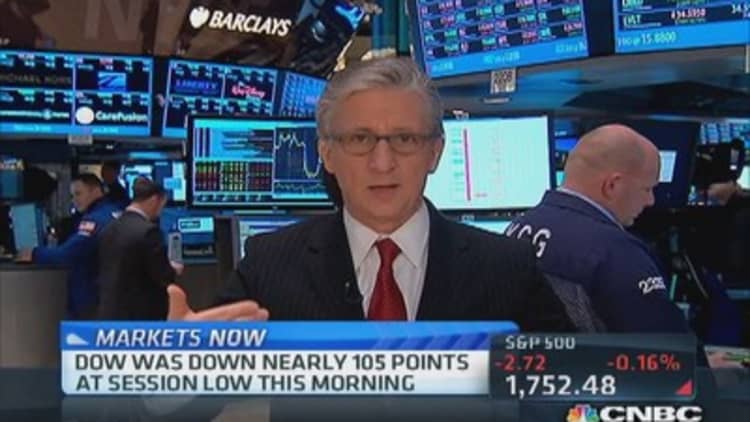
U.S. stocks fell mildly on Wednesday, with the S&P 500 finishing the session near unchanged, as a better-than-expected report on the service sector helped neutralize another that had companies adding slightly fewer employees to their payrolls than anticipated in January.
"Basically we're trading off the loss of the last couple of weeks. We had modest economic numbers and earnings, but I don't see anything moving the market with any conviction. Yesterday we were up with a technical bounce, and today we're just trying to see how things develop," said Stephen Carl, head equity trader at the Williams Capital Group.
Private employers added 175,000 jobs in January, slightly below the gain of 180,000 estimated by analysts. December's increase in jobs was revised lower to 227,000 from an initial 238,000. The report comes two days before the government's nonfarm payroll report, a gauge that includes public and private-sector employment.
The Institute for Supply Management's non-manufacturing index for January came in at 54.0, showing expansion at a more rapid rate in January.
"In front of the nonfarm payroll report on Friday, the solid ADP number as well as the employment component should ease some of the worst worries regarding job growth although uncertainty remains elevated," Dan Greenhaus, chief global strategist at BTIG.
Major U.S. Indexes
Erasing losses that had it down 104 points early on, the Dow Jones Industrial Average fell 5.01 points to 15,440.23. Component Merck cleared gains that came with enthusiasm for its newly announced cancer-drug partnership with competitors, with its shares now in the red on quarterly profit and sales that came in just below estimates.
Off the Dow, Ralph Lauren fell, also turning course after premarket gains after the designer-clothing company posted a 10 percent rise in third-quarter profit.
The dipped 3.56 points, or 0.2 percent, to 1,751.64, with telecommunications hardest hit and technology faring best among its 10 major sectors.
The Nasdaq lost 19.97 points, or 0.5 percent, to 4,011.55.
Federal Reserve Bank of Philadelphia President Charles Plosser said he anticipates the U.S. economy will expand 3 percent this year as the unemployment rate declines to 6.2 percent by the end of 2014, justifying a faster tapering of the central bank's monthly asset purchases. Other central banker talk Wednesday had Atlanta Fed President Dennis Lockhart labeling stocks as in correction mode, and saying the market may have gotten ahead of itself.
Lockhart echoed the view of many analysts, many of whom believe Wall Street has been looking for a reason to take a break from 2013's unsustainable climb that had the S&P finishing the year up nearly 30 percent.

The dollar declined against the currencies of major U.S. trading partners and the yield on the 10-year Treasury note used in figuring mortgage rates and other consumers loans rose 4 basis points to 2.669 percent.
Crude-oil futures for March delivery rose 19 cents, or 0.2 percent, to $97.38 a barrel; gold futures for April delivery rose $5.70, or 0.5 percent, to $1,256.90 an ounce.
Small cap stocks on the Russell 2000 fell 8 percent from their high, nearing the 10 percent level viewed by many as a technical correction.
On Tuesday, stocks climbed after the prior day's rout, with the Dow industrials halting a four-session run of triple-digit moves.
—By CNBC's Kate Gibson
(CORRECTION: This story corrects the percentage decline from its recent high in the Russell 2000)


